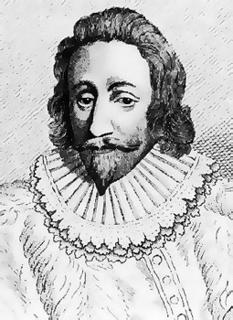External links
- Stephen, Leslie; Lee, Sidney, eds. (1891). . Dictionary of National Biography . 25. London: Smith, Elder & Co.
- Hutchinson, John (1892). . Men of Kent and Kentishmen (Subscription ed.). Canterbury: Cross & Jackman. p. 68.
Sir Thomas Hawkins (died c.1640) was an English poet and translator. [1]
He was the eldest son of Sir Thomas Hawkins, knight-banneret, of Nash Court, Kent, by Anne, daughter and heiress of Cyriac Pettit, of Boughton-under-the-Blean in the same county. John Hawkins M.D., and Henry Hawkins the Jesuit, were his brothers. He succeeded to the family estates on the death of his father, 10 April 1617, and was knighted by James I at Whitehall Palace 4 May 1618. [2]
Hawkins was a friend and correspondent of James Howell, who mentions him in the Epistolæ Ho-elianæ , and he was also acquainted with Edmund Bolton, who selected him in 1624 to be one of the original 84 members of his projected Royal Academy. Like all the members of his family, he was a staunch recusant. On 11 December 1633 an attempt was made under a council-warrant to search his house for Father Symons, a Carmelite friar, and others. Lady Hawkins would not admit the officers without a special warrant, saying that her husband had the great seal of England in his trunk to protect her house, and the matter seems to have dropped there. [2]
Hawkins died at Nash Court, Kent, towards the close of 1640, and was buried near the graves of his father and mother. [2]
Hawkins wrote: [2]
Hawkins married Elizabeth, daughter of George Smith of Ashby Folville, Leicestershire. They had two sons, John and Thomas, both of whom died young and without issue. [2]

Sir William Davenant, also spelled D'Avenant, was an English poet and playwright. Along with Thomas Killigrew, Davenant was one of the rare figures in English Renaissance theatre whose career spanned both the Caroline and Restoration eras and who was active both before and after the English Civil War and during the Interregnum.

James Shirley was an English dramatist.
Thomas Nabbes was an English dramatist.

Sir Francis Windebank was an English politician who was Secretary of State under Charles I.
William Habington was an English poet.

Richard Brome ; was an English dramatist of the Caroline era.

Boughton under Blean is a village and civil parish between Faversham and Canterbury in south-east England. "Boughton under Blean" technically refers only to the hamlet at the top of Boughton Hill; the main village at the foot of the hill is named Boughton Street, but the whole is referred to as "Boughton under Blean" or more commonly as just "Boughton". The Blean refers to the Forest of Blean, an area of long-standing Kent woodland covering over 11 square miles.
The Emperor of the East is a Caroline era stage play, a tragicomedy written by Philip Massinger and first published in 1632. The play provides an interesting example of the treatment of the Roman Catholic sacrament of confession in English Renaissance theatre.
Thomas Greene of Bobbing, Kent, 2nd Proprietary Governor of Maryland was an early settler of the Maryland colony and second Provincial Governor of the colony from 1647 to 1648.
Richard Hawkins was a London publisher of the Jacobean and Caroline eras. He was a member of the syndicate that published the Second Folio collection of Shakespeare's plays in 1632. His bookshop was in Chancery Lane, near Sergeant's Inn.
Andrew Crooke and William Cooke were London publishers of the mid-17th-century. In partnership and individually, they issued significant texts of English Renaissance drama, most notably of the plays of James Shirley.
Events from the 1630s in England.
William Leake, father and son, were London publishers and booksellers of the late sixteenth and the seventeenth centuries. They were responsible for a range of texts in English Renaissance drama and poetry, including works by Shakespeare and Beaumont and Fletcher.
Edward Grimeston was an English sergeant-at-arms and one of the most active translators of his day.
Henry Hexham was an English military writer. He also worked on Mercator's Atlas and on a Copious English and Nether-duytch Dictionarie.
Matthias Sention Sr. was a founding settler of Dorchester, Massachusetts, of Windsor, Connecticut, of Wethersfield, Connecticut and of Norwalk, Connecticut.
Robert Codrington (c.1602–c.1665) was an English author, known as a translator.
John Hawkins M.D. (c.1587–c.1641) was an English physician, known as a grammarian and translator.